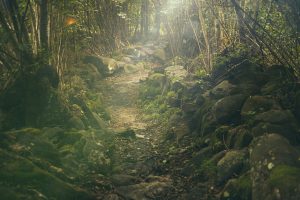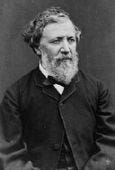
At the end of the first post in this series I quoted William Wordsworth from his poem Intimations of Immortality from Recollections of Early Childhood. He obviously understands the nature of incarnation, and how the soul forgets its pre-existence:
Our birth is but a sleep and a forgetting: The Soul that rises with us, our life’s Star, Hath had elsewhere its setting, And cometh from afar: Not in entire forgetfulness, And not in utter nakedness, But trailing clouds of glory do we come From God, who is our home: Heaven lies about us in our infancy!
He goes on to say that the soul later becomes trapped in the “shades of the prison-house”.
Here is Robert Browning writing in similar vein, from his epic poem Paracelsus:
Truth is within ourselves: it takes no rise From outward things, whate’er we may believe. There is an inmost centre in us all Where Truth abides in fullness: and around Wall upon wall, the gross flesh hems it in. That perfect clear perception – which is truth. A baffling and perverting carnal mesh Binds it, and makes all error: and, to KNOW, Rather consists in opening out a way Whence the imprisoned splendour may escape, Than in effecting entry for a light Supposed to be without.
So here we have two poets who understand the spiritual truth that we as humans are a consciousness (which I choose to call the soul), which has become imprisoned in flesh and subject to error and illusion. Consciousness is therefore separate from and independent of the brain which, as I have argued previously, is an organ which acts as a reducing-valve, and limits consciousness.
What do modern, materialist scientists have to say? Their question is, how is the physical brain capable of producing consciousness, a conscious self? This is called the ‘hard question’, because it is seemingly impossible to answer. Richard Dawkins, when presented with statements about religion or the paranormal, is fond of replying “where is the evidence?” I therefore ask, where is the evidence that the brain produces consciousness? My own answer is that there isn’t any, and not only that, but there can never be any such evidence, because the statement is not true.
None of this has any effect upon materialist scientists because they are locked into their myth, which has become a reality for them, so that they no longer realise that it is only one worldview amongst others. They are incapable of understanding that their question is based on an assumption which is possibly and arguably illusory.
New Scientist magazine makes frequent reference to this problem; here are some examples:
- “Consciousness: The what, why and how… There are a lot of hard problems in the world, but only one of them gets to call itself ‘the hard problem’. And that is the problem of consciousness — how a kilogram or so of nerve cells conjures up the seamless kaleidoscope of sensations, thoughts, memories and emotions that occupy every waking moment” (1).
- “What makes you conscious — and where is it in your brain? Is turning on consciousness more like pressing a button, or operating a dimmer switch? The whys and hows of awareness are maddeningly hard to pin down” (2).
One common claim is that the self, because no scientific explanation can be found for it, is actually an illusion. I have discussed this in previous articles (3). Here are some further examples, which are also headlines from New Scientist magazine:
- “Metaphysics special: What is consciousness? How does something as physical as the brain create something as immaterial as your sense of self? It could all just be one big trick of the mind” (4).
- “Consciousness evolved for the greater good, not just the self. The unconscious mind tricks you into believing in a sense of self, argue two psychologists. And it does this for an unexpected reason” (5).
When will these scientists ever learn? Perhaps they should read more poetry.
Footnotes:
(1) headline from their website
(2) from an online version of an article by Linda Geddes, issue 3065, March 19th 2016
(3) see the previous posts: The Folly of Modern Neuroscience, Is the Self an Illusion? – Part 1, and Part 2. There is also a series of articles, see under Consciousness on the Articles Index page.
(4) by Anil Ananthaswamy, issue 3089, September 3rd 2016
(5) by Peter Halligan and David Oakley, issue 3034, August 15th 2015
